英文人物传记:a brief bibliography of Benjamin Franklin
- 格式:docx
- 大小:16.29 KB
- 文档页数:2
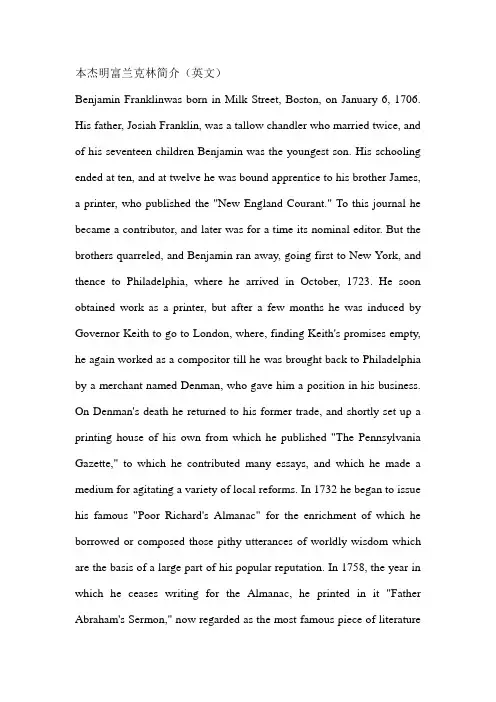
本杰明富兰克林简介(英文)Benjamin Franklinwas born in Milk Street, Boston, on January 6, 1706. His father, Josiah Franklin, was a tallow chandler who married twice, and of his seventeen children Benjamin was the youngest son. His schooling ended at ten, and at twelve he was bound apprentice to his brother James, a printer, who published the "New England Courant." To this journal he became a contributor, and later was for a time its nominal editor. But the brothers quarreled, and Benjamin ran away, going first to New York, and thence to Philadelphia, where he arrived in October, 1723. He soon obtained work as a printer, but after a few months he was induced by Governor Keith to go to London, where, finding Keith's promises empty, he again worked as a compositor till he was brought back to Philadelphia by a merchant named Denman, who gave him a position in his business. On Denman's death he returned to his former trade, and shortly set up a printing house of his own from which he published "The Pennsylvania Gazette," to which he contributed many essays, and which he made a medium for agitating a variety of local reforms. In 1732 he began to issue his famous "Poor Richard's Almanac" for the enrichment of which he borrowed or composed those pithy utterances of worldly wisdom which are the basis of a large part of his popular reputation. In 1758, the year in which he ceases writing for the Almanac, he printed in it "Father Abraham's Sermon," now regarded as the most famous piece of literatureproduced in Colonial America. Meantime Franklin was concerning himself more and more with public affairs. He set forth a scheme for an Academy, which was taken up later and finally developed into the University of Pennsylvania; and he founded an "American Philosophical Society" for the purpose of enabling scientific men to communicate their discoveries to one another. He himself had already begun his electrical researches, which, with other scientific inquiries, he called on in the intervals of money-making and politics to the end of his life. In 1748 he sold his business in order to get leisure for study, having now acquired comparative wealth; and in a few years he had made discoveries that gave him a reputation with the learned throughout Europe.。
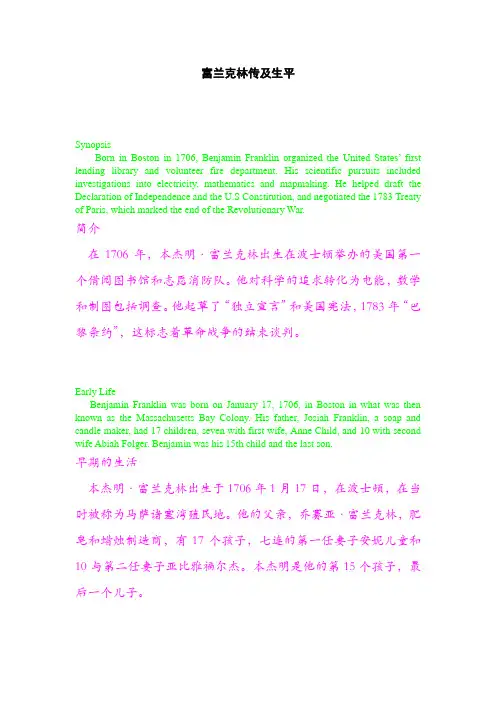
富兰克林传及生平SynopsisBorn in Boston in 1706, Benjamin Franklin organized the United States’ first lending library and volunteer fire department. His scientific pursuits included investigations into electricity, mathematics and mapmaking. He helped draft the Declaration of Independence and the U.S Constitution, and negotiated the 1783 Treaty of Paris, which marked the end of the Revolutionary War.简介在1706年,本杰明·富兰克林出生在波士顿举办的美国第一个借阅图书馆和志愿消防队。
他对科学的追求转化为电能,数学和制图包括调查。
他起草了“独立宣言”和美国宪法,1783年“巴黎条约”,这标志着革命战争的结束谈判。
Early LifeBenjamin Franklin was born on January 17, 1706, in Boston in what was then known as the Massachusetts Bay Colony. His father, Josiah Franklin, a soap and candle maker, had 17 children, seven with first wife, Anne Child, and 10 with second wife Abiah Folger. Benjamin was his 15th child and the last son.早期的生活本杰明·富兰克林出生于1706年1月17日,在波士顿,在当时被称为马萨诸塞湾殖民地。
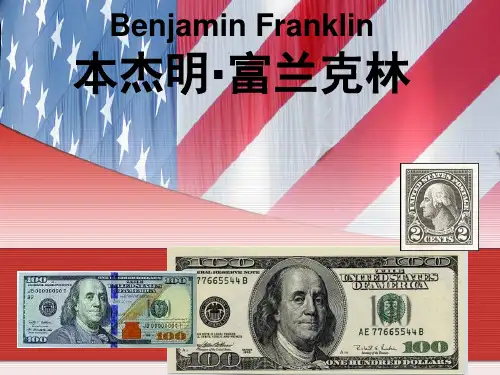
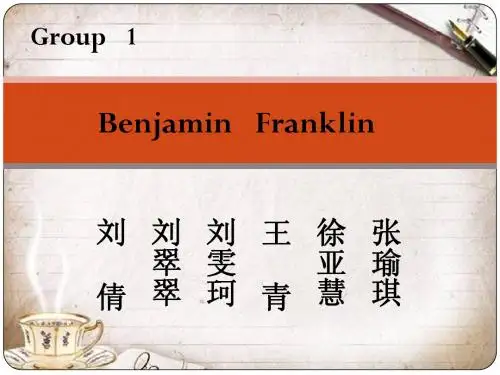
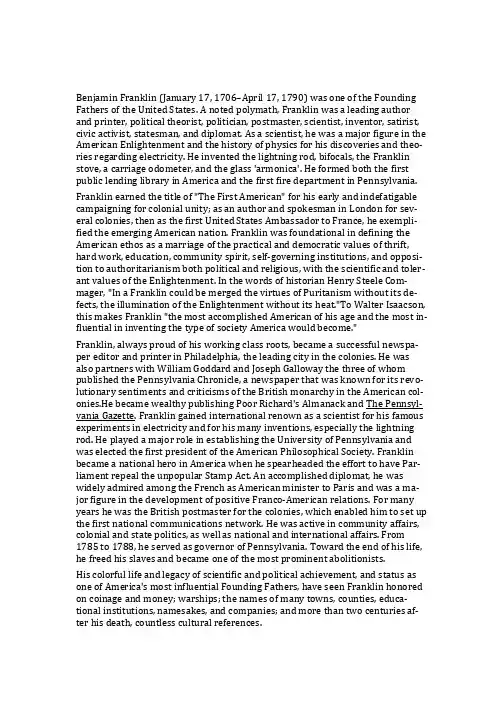
Benjamin Franklin (January 17, 1706–April 17, 1790) was one of the Founding Fa-thers of the United States. A noted polymath, Franklin was a leading author and prin-ter, political theorist, politician, postmaster, scientist, inventor, satirist, civic activist, statesman, and diplomat. As a scientist, he was a major figure in the American En-lightenment and the history of physics for his discoveries and theories regarding elec-tricity. He invented the lightning rod, bifocals, the Franklin stove, a carriage odome-ter, and the glass 'armonica'. He formed both the first public lending library in Ameri-ca and the first fire department in Pennsylvania.Franklin earned the title of "The First American" for his early and indefatigable cam-paigning for colonial unity; as an author and spokesman in London for several colo-nies, then as the first United States Ambassador to France, he exemplified the emerg-ing American nation. Franklin was foundational in defining the American ethos as a marriage of the practical and democratic values of thrift, hard work, education, com-munity spirit, self-governing institutions, and opposition to authoritarianism both po-litical and religious, with the scientific and tolerant values of the Enlightenment. In the words of historian Henry Steele Commager, "In a Franklin could be merged the virtues of Puritanism without its defects, the illumination of the Enlightenment with-out its heat."To Walter Isaacson, this makes Franklin "the most accomplished Ameri-can of his age and the most influential in inventing the type of society America would become."Franklin, always proud of his working class roots, became a successful newspaper editor and printer in Philadelphia, the leading city in the colonies. He was also part-ners with William Goddard and Joseph Galloway the three of whom published the Pennsylvania Chronicle, a newspaper that was known for its revolutionary sentiments and criticisms of the British monarchy in the American colonies.He became wealthy publishing Poor Richard's Almanack and The Pennsylvania Gazette. Franklin gained international renown as a scientist for his famous experiments in electricity and for his many inventions, especially the lightning rod. He played a major role in establishing the University of Pennsylvania and was elected the first president of the American Philosophical Society. Franklin became a national hero in America when he spear-headed the effort to have Parliament repeal the unpopular Stamp Act. An accom-plished diplomat, he was widely admired among the French as American minister to Paris and was a major figure in the development of positive Franco-American rela-tions. For many years he was the British postmaster for the colonies, which enabled him to set up the first national communications network. He was active in community affairs, colonial and state politics, as well as national and international affairs. From 1785 to 1788, he served as governor of Pennsylvania. Toward the end of his life, he freed his slaves and became one of the most prominent abolitionists.His colorful life and legacy of scientific and political achievement, and status as one of America's most influential Founding Fathers, have seen Franklin honored on coi-nage and money; warships; the names of many towns, counties, educational institu-tions, namesakes, and companies; and more than two centuries after his death, count-less cultural references.Book reportFranklin was not in favorable growth environment, and it should be a relatively plain appearance. In 1706 he was in North America, the home of 17 children. His father is involved in wax and soap as a small businessman, Franklin entered the school for about two years before dropping out of school because of family distress. Then he went to work as an apprentice in his brother’s shop, the apprentice days was very dif-ficult, but he did a good use of the apprenticeship leisure time to study hard, and read a lot of books in politics, science, history and literature. He was also proficient in the use of French, Italian, Spanish and Latin.In 1726 Franklin manages a printing factory, it was a great success which created a legend of the American dream, and he printed a huge impact ―Pennsylvania‖. He in-vented the lightning rod, dual-purpose glasses, new stove and new lights. He pio-neered the North American colonies the slogan that is ―not join the death‖ and drafted out the drafting of ―Declaration of Independence‖ published in 1771 which changed the fate of countless people, and this book gave a description of its process of growth and exhorted the people to be positive.(换ppt)There are a lot of Proverbs in this book that Franklin felt in his life, reading this book is not only to feel the sentiment, but also to combine their training and humanity and then to improve ourselves, the book describes each chapter are a true portrayal of his life and tell us how to get all the perception which inspired me very much.In his view, reading is the key to success. Books give us wisdom, strengthen our de-termination and let us have the wisdom of the trip of our life.Franklin attaches great importance to his virtue. Therefore, he proposed to 13 re-quirements for himself namely: control, quiet, orderly life, determination, frugality, diligence, sincerity, justice, moderation, cleanliness, tranquility, chastity and humility. He has been trying to do that, though he cannot completely meet all the requirements, but he was persistent. The people who can meet the 13 requirements can be called ―saints‖of the fact that people are rarely perfect, but it can pursue such a perfect people in the United States and Germany who have achieved great success. Franklin was revered as the father of America for his impressive image that can main-tain a frugal life style of work for the public welfare and make immortal contribu-tions, compared to the majority of people we can knew how impetuous we are.(huan) In this clear, crisply written story of his life, Benjamin Franklin shows the reader what his childhood was like and what he came to value as meaningful and worthwhile techniques of communication, conduct, and self-improvement. A conscientious and serious youth, Franklin nevertheless left his boyhood town because he had impreg-nated a young lady. This early act of responsibility led him to pursue work that led him, in the coming years of the American Revolution, to be a strong advocate of polit-ical independence, even at the cost of war. Franklin became as fine a statesman as ev-er the United States was to produce. One of the country's founding fathers and a tire-less champion of individual liberty, he also served as the American ambassador to France. He tells of how he learned the printing trade and how he established "Poor Richard's Almanac." He also shares with his readers his hopes for the free country that he helped to bring into being. The reader cannot help but admire this brilliant and brave founding father, as much for his humility as for his services to his country and its future citizens.(huan)名言Silence is not always a sign of wisdom, but babbling is ever a folly.沉默并不是智慧的标志,但唠叨永远是一项蠢行。
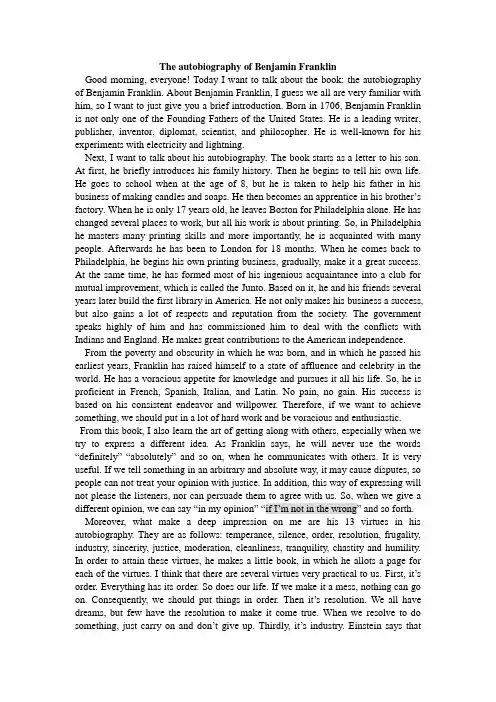
The autobiography of Benjamin FranklinGood morning, everyone! Today I want to talk about the book: the autobiography of Benjamin Franklin. About Benjamin Franklin, I guess we all are very familiar with him, so I want to just give you a brief introduction. Born in 1706, Benjamin Franklin is not only one of the Founding Fathers of the United States. He is a leading writer, publisher, inventor, diplomat, scientist, and philosopher. He is well-known for his experiments with electricity and lightning.Next, I want to talk about his autobiography. The book starts as a letter to his son. At first, he briefly introduces his family history. Then he begins to tell his own life. He goes to school when at the age of 8, but he is taken to help his father in his business of making candles and soaps. He then becomes an apprentice in his brother’s factory. When he is only 17 years old, he leaves Boston for Philadelphia alone. He has changed several places to work, but all his work is about printing. So, in Philadelphia he masters many printing skills and more importantly, he is acquainted with many people. Afterwards he has been to London for 18 months. When he comes back to Philadelphia, he begins his own printing business, gradually, make it a great success. At the same time, he has formed most of his ingenious acquaintance into a club for mutual improvement, which is called the Junto. Based on it, he and his friends several years later build the first library in America. He not only makes his business a success, but also gains a lot of respects and reputation from the society. The government speaks highly of him and has commissioned him to deal with the conflicts with Indians and England. He makes great contributions to the American independence. From the poverty and obscurity in which he was born, and in which he passed his earliest years, Franklin has raised himself to a state of affluence and celebrity in the world. He has a voracious appetite for knowledge and pursues it all his life. So, he is proficient in French, Spanish, Italian, and Latin. No pain, no gain. His success is based on his consistent endeavor and willpower. Therefore, if we want to achieve something, we should put in a lot of hard work and be voracious and enthusiastic. From this book, I also learn the art of getting along with others, especially when we try to express a different idea. As Franklin says, he will never use the words “definitely” “absolutely”and so on, when he communicates with others. It is very useful. If we tell something in an arbitrary and absolute way, it may cause disputes, so people can not treat your opinion with justice. In addition, this way of expressing will not please the listeners, nor can persuade them to agree with us. So, when we give a different opinion, we can say “in my opinion” “if I’m not in the wrong” and so forth. Moreover, what make a deep impression on me are his 13 virtues in his autobiography. They are as follows: temperance, silence, order, resolution, frugality, industry, sincerity, justice, moderation, cleanliness, tranquility, chastity and humility. In order to attain these virtues, he makes a little book, in which he allots a page for each of the virtues. I think that there are several virtues very practical to us. First, it’s order. Everything has its order. So does our life. If we make it a mess, nothing can go on. Consequently, we should put things in order. Then it’s resolution. We all have dreams, but few have the resolution to make it come true. When we resolve to do something, just carry on and don’t give up. Thirdly, it’s industry. Einstein says thatgenius is 1% inspiration and 99% perspiration. No one could succeed without hard working. Therefore, don’t waste time and work hard, we will harvest a lot. Finally, it’s sincerity. Being sincere is very important, especially to friends. The maintenance of a friendship is not only based on the mutual trust and understanding, but also based on the sincerity.In a word, I benefit a lot from his autobiography. The words he uses are easy to understand and quite philosophical. Moreover, the way he conducts himself teaches me a lot. And more importantly, I learn that nothing in the world is impossible, if you set your mind to do it.。
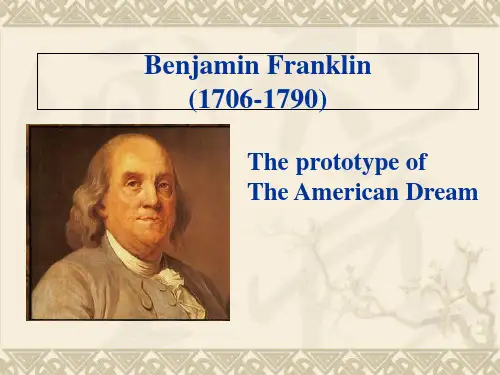
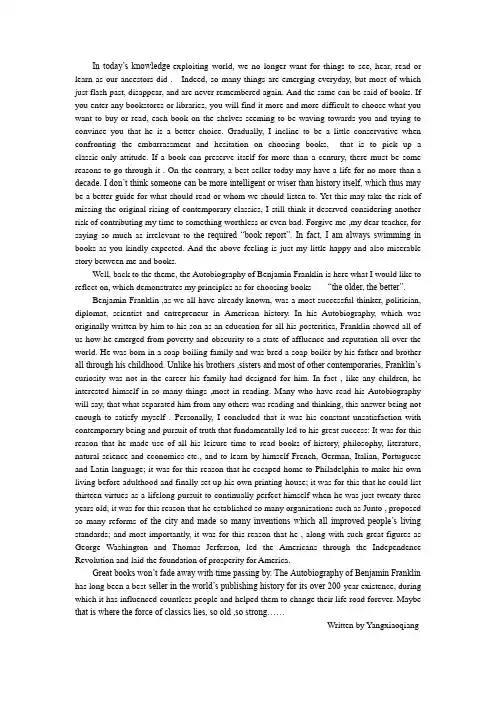
In today’s knowledge-exploiting world, we no longer want for things to see, hear, read or learn as our ancestors did . Indeed, so many things are emerging everyday, but most of which just flash past, disappear, and are never remembered again. And the same can be said of books. If you enter any bookstores or libraries, you will find it more and more difficult to choose what you want to buy or read, each book on the shelves seeming to be waving towards you and trying to convince you that he is a better choice. Gradually, I incline to be a little conservative when confronting the embarrassment and hesitation on choosing books, that is to pick up a classic-only attitude. If a book can preserve itself for more than a century, there must be some reasons to go through it . On the contrary, a best-seller today may have a life for no more than a decade. I don’t think someone can be more intelligent or wiser than history itself, which thus may be a better guide for what should read or whom we should listen to. Y et this may take the risk of missing the original rising of contemporary classics, I still think it deserved considering another risk of contributing my time to something worthless or even bad. Forgive me ,my dear teacher, for saying so much as irrelevant to th e required “book report”. In fact, I am always swimming in books as you kindly expected. And the above feeling is just my little happy and also miserable story between me and books.Well, back to the theme, the Autobiography of Benjamin Franklin is here what I would like to reflect on, which demonstrates my principles as for choosing books -----“the older, the better”.Benjamin Franklin ,as we all have already known, was a most successful thinker, politician, diplomat, scientist and entrepreneur in American history. In his Autobiography, which was originally written by him to his son as an education for all his posterities, Franklin showed all of us how he emerged from poverty and obscurity to a state of affluence and reputation all over the world. He was born in a soap-boiling family and was bred a soap-boiler by his father and brother all through his childhood. Unlike his brothers ,sisters and most of other contemporaries, Franklin’s curiosity was not in the career his family had designed for him. In fact , like any children, he interested himself in so many things ,most in reading. Many who have read his Autobiography will say, that what separated him from any others was reading and thinking, this answer being not enough to satisfy myself . Personally, I concluded that it was his constant unsatisfaction with contemporary being and pursuit of truth that fundamentally led to his great success: It was for this reason that he made use of all his leisure time to read books of history, philosophy, literature, natural science and economics etc., and to learn by himself French, German, Italian, Portuguese and Latin language; it was for this reason that he escaped home to Philadelphia to make his own living before adulthood and finally set up his own printing-house; it was for this that he could list thirteen virtues as a lifelong pursuit to continually perfect himself when he was just twenty-three years old; it was for this reason that he established so many organizations such as Junto , proposed so many reforms of the city and made so many inventions which all improved people’s living standards; and most importantly, it was for this reason that he , along with such great figures as George Washington and Thomas Jerferson, led the Americans through the Independence Revolution and laid the foundation of prosperity for America.Great books won’t fade away with time passing by. The Autobiography of Benjamin Franklin has long been a best-seller in the world’s publishing history for its over 200-year existence, during which it has influenced countless people and helped them to change their life road forever. Maybe that is where the force of classics lies, so old ,so strong……Written by Y angxiaoqiang。
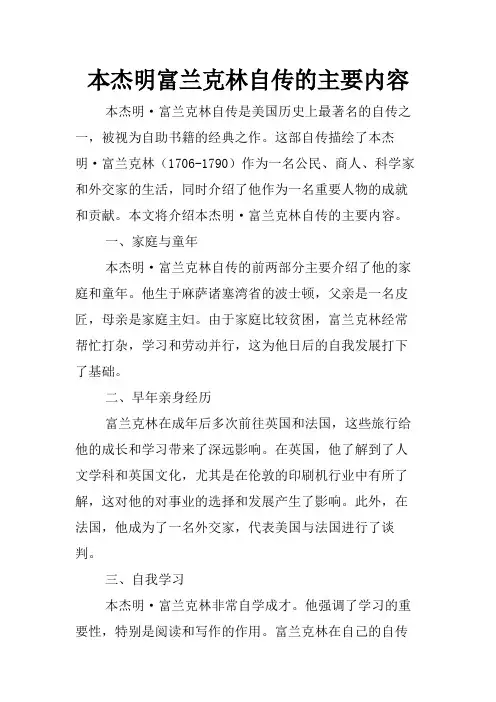
本杰明富兰克林自传的主要内容本杰明·富兰克林自传是美国历史上最著名的自传之一,被视为自助书籍的经典之作。
这部自传描绘了本杰明·富兰克林(1706-1790)作为一名公民、商人、科学家和外交家的生活,同时介绍了他作为一名重要人物的成就和贡献。
本文将介绍本杰明·富兰克林自传的主要内容。
一、家庭与童年本杰明·富兰克林自传的前两部分主要介绍了他的家庭和童年。
他生于麻萨诸塞湾省的波士顿,父亲是一名皮匠,母亲是家庭主妇。
由于家庭比较贫困,富兰克林经常帮忙打杂,学习和劳动并行,这为他日后的自我发展打下了基础。
二、早年亲身经历富兰克林在成年后多次前往英国和法国,这些旅行给他的成长和学习带来了深远影响。
在英国,他了解到了人文学科和英国文化,尤其是在伦敦的印刷机行业中有所了解,这对他的对事业的选择和发展产生了影响。
此外,在法国,他成为了一名外交家,代表美国与法国进行了谈判。
三、自我学习本杰明·富兰克林非常自学成才。
他强调了学习的重要性,特别是阅读和写作的作用。
富兰克林在自己的自传中写道:“我开始自学成才并立志要让自己变得更好,受到的教导并不比同行多,我也不是天才。
我唯一的智慧是决心持久,工作勤奋,注重学习,善于思考。
”四、事业概述在事业方面,富兰克林是一名成功的商人。
他创办的“波士顿新闻报”是印刷业的重要杂志。
同时,他还在各种事业领域成名称震四方的人物。
他是公共服务的积极参与者,经常参加赈灾和救济行动,为社会做出了贡献。
五、道德与人生哲学本杰明·富兰克林的自传中探讨了一些重要的道德和生活价值。
富兰克林提到了他的“13个美德”,这是他在自己的生活和事业中生效的准则。
这些涵盖了诚实、谦恭、勤劳、自制、关爱家庭、宽容、公正、谨慎、坚定、勇敢、诚实、宽容和谦虚。
六、公共职责本杰明·富兰克林非常重视公共职责和社会贡献。
他相信美国必须有一种民主方式来治理自己,特别是在政治和公共事务方面。
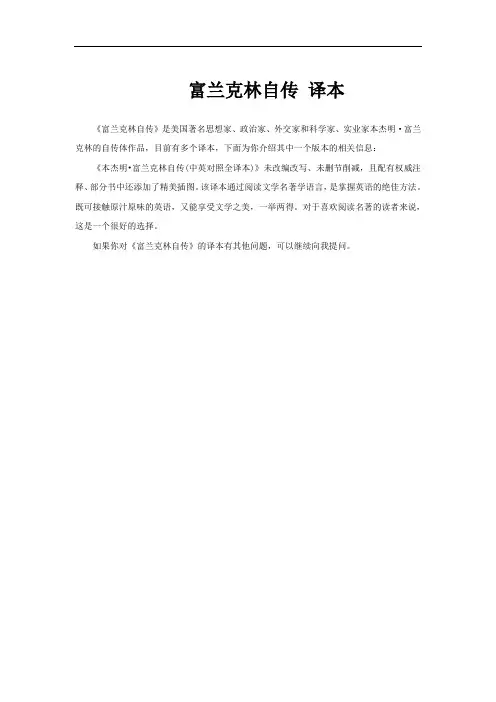
富兰克林自传译本
《富兰克林自传》是美国著名思想家、政治家、外交家和科学家、实业家本杰明·富兰克林的自传体作品,目前有多个译本,下面为你介绍其中一个版本的相关信息:《本杰明•富兰克林自传(中英对照全译本)》未改编改写、未删节削减,且配有权威注释、部分书中还添加了精美插图。
该译本通过阅读文学名著学语言,是掌握英语的绝佳方法。
既可接触原汁原味的英语,又能享受文学之美,一举两得。
对于喜欢阅读名著的读者来说,这是一个很好的选择。
如果你对《富兰克林自传》的译本有其他问题,可以继续向我提问。
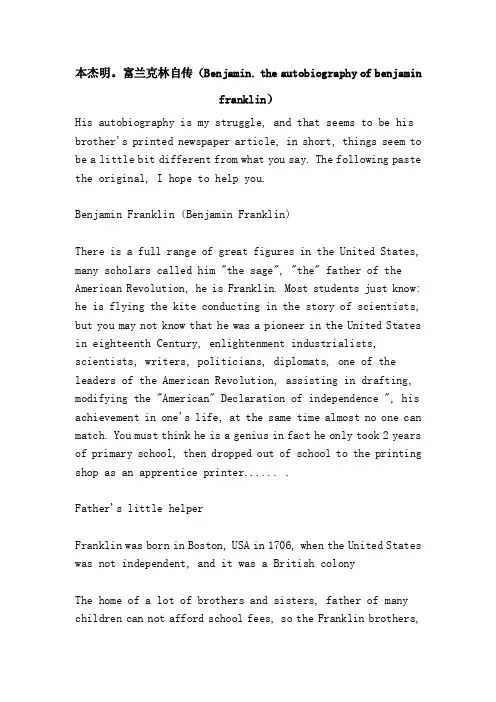
本杰明。
富兰克林自传(Benjamin. the autobiography of benjaminfranklin)His autobiography is my struggle, and that seems to be his brother's printed newspaper article, in short, things seem to be a little bit different from what you say. The following paste the original, I hope to help you.Benjamin Franklin (Benjamin Franklin)There is a full range of great figures in the United States, many scholars called him "the sage", "the" father of the American Revolution, he is Franklin. Most students just know: he is flying the kite conducting in the story of scientists, but you may not know that he was a pioneer in the United States in eighteenth Century, enlightenment industrialists, scientists, writers, politicians, diplomats, one of the leaders of the American Revolution, assisting in drafting, modifying the "American" Declaration of independence ", his achievement in one's life, at the same time almost no one can match. You must think he is a genius in fact he only took 2 years of primary school, then dropped out of school to the printing shop as an apprentice printer...... .Father's little helperFranklin was born in Boston, USA in 1706, when the United States was not independent, and it was a British colonyThe home of a lot of brothers and sisters, father of many children can not afford school fees, so the Franklin brothers,very early into a variety of different industries, Baishixueyi. At that time, nothing matters than to learn more important proficiency in a particular line, supporting the family. Therefore, although Franklin had school, but at the age of 10, began when the father's business little helper, operating oil and candles, soap making. Franklin's father is a versatile, strong man, in painting, music, machinery have talent, in dealing with some things, can often exhibit profound insights and correct the judge, he also often invited the local people with wisdom to many social and life problems at home, Franklin in this environment influence, from an early age to develop good, honest, prudent, constantly seek knowledge and virtue.Because grew up in coastal areas, Franklin grew to love the sea, very good at swimming, boating, so the body is very good, which makes the little sick in his life. His childhood biggest dream is to go to sea, the father to worry he left home to go sailing, will bring him around, often take him to watch some outstanding craftsmen I hope to work, his interest is fixed in a land-based industry. Because of this, Franklin savvy, plus the inquisitive, he quickly learned to use many skills and tools, so he can easily make some experiments or self-made small machinery.Printers' articlesAt the age of 12, his brother James back to a printing machine and the type from the UK, at his father's behest, Franklin began when his brother's Apprentice (right: as an apprentice of Franklin), learning the printing. This period of apprenticeship period, he often found because he has never gone to school, so write or write the lack of vocabulary, grammar,confusion, with his father a communication content he and his friends, also accused him of: organized as others clearly worded as the other elegant. This makes Franklin feel very sad, but he was determined to write the article. Then he began to read a lot of books that magazine, and the imitation of publications on the style. His way is to put the thought outline in mind, then their vocabulary and grammar re expression, and then compared with the original article, find their own inadequacies. By constantly reading, continue to write, by his writing, he also anonymously, for a number of articles to brother James's "new England" report, at that time, James's newspaper has considerable popularity and sales, brother thought he was a learned famous scholar Franklin of that time is only 15,6 years old.American people who drink waterIn fact, Franklin and his brother often quarrel, partly because Franklin young, often contradict brother hand; James also quite irritable temper, motionless on the apprentice brother finally got two cuff and kick, finally part.Leave the brother of Franklin, this year only 17 years old, he decided to make a career for himself.',Penniless Franklin, first find a printing job in Philadelphia, with excellent technology and serious attitude, gradually he was boss, he also does not necessarily make some money, but to be honest, studious person, to discuss with each other articles, poetry, philosophy of life.Later, after Franklin also went to Britain, originally thought can be funded in the UK, he realized his own business ideas, but progress is not smooth, he had to stay in the UK. The British printing workers are mostly alcoholic, because they think that drinking can increase strength, but Franklin is different, he thought control diet can make the mind clear, quick thinking, improve the efficiency, so he did not drink, is a vegetarian, so the factory Brits are mocking him as "water American". Although the drink do not drink, Franklin is very hard, typesetting is also the fastest, so always be designated for some urgent, so his salary is particularly high.A businessman with high moral standardsIn 1726, Franklin returned to America in Philadelphia, with their hard work and talent, he not only has a good printing technology, but also produce copper, type, and his cultural level has been out of the ordinary printing workers, he can read, write, do have their own views and thinking, more important is he formed its own set of moral ethics.God has brought opportunities for those who are ready for Franklin, and others from the joint venture printing shop, stationery shop, to their wholly owned business from the general public documents, printing, votes, has been extended to printing money, own a newspaper... Every day, often busy until 11 at night. The hard-working, industrious and frugal, Franklin quickly settled business loans, but he never set foot in useless entertainment, never fishing, hunting, always reading in his spare time, he loves his work, often personally delivery, and adherence to credit, promise others, never owed;slowly, more and more people know Franklin, know that he is an honest, trustworthy, with high moral standards. The cultural businessman, all people are willing to make friends with such a person or business.Devote oneself to public affairsMany people support, Franklin has been back. He initially established the "secret agency", members of the moral, political, natural philosophy and other issues to discuss with each other, not to discuss the way of writing, argue to win attitude, but to explore the spirit of truth. The proper functioning, and later derived other secret societies sub associations, secret societies lasted 40 years, became the Pennsylvania, many political and social issues of the wind ball.The secret society members to discuss issues, often need to reference books evidence, Franklin suggested that the individual books together, and later founded the library, derived for the public nature of the project, the establishment of a public library, the library is a subscription library later America originator.Franklin was elected in 1736 the State Council Secretary, formally entered the political arena, the Franklin shift the focus of the work to the public affairs organization: the fire brigade, the establishment of fire insurance company, donated the orphanage, the establishment of Pennsylvania United defense, founded the University of Pennsylvania, helping to run the hospital, and served as Postmaster General of America in1753, Prime Minister America postal work, these achievements of the American education, culture, military, social influence.In 1754, representatives of the colonies in North America adopted the coalition plan drafted by Franklin during the meeting. In the meeting, he put forward the slogan "disunity leads to extinction", calling for the unity of the colonial people and the struggle for freedomIn 1775, Franklin was elected as the representative of the Second Continental Congress, and participated in drafting and modifying the declaration of independenceIn 1776, plenipotentiary appointed the United States to Paris, completed a series of diplomatic missions, and successfully promoted the alliance between the United States and FranceIn 1785, Franklin served as governor of Pennsylvania, and was reelected for three times due to the trust and love of the people throughout the stateIn 1787, the United States took part in the Constitutional Convention and worked hard to abolish slaveryAchievement in science Philadelphia experimentFranklin began his electrical study after reading the Leiden battery in 1746, according to his opinion,He believes that the nature of electricity and lightningfriction is the same, it is for long-term observation, comparison and analysis of lightning, and found that they have many things in common: including light, light color zigzag shape can be made of metal, conductive, a popping sound. The bold Franklin, planned to an amazing experiment..........In July 1752, Franklin and his son William, in an opening of the woodshed, connected with lightning experiment. First he made of silk kite, the top of the metal wire tied a thin, with a long rope with a kite. The other end of the rope tied for peripheral insulated ribbon, because people hide in the woodshed, ribbon keep dry, the other end of the ribbon and ribbon kite in hand. At the junction, hang a bunch of keys as a circuit breaker to prevent electric shock. When lightning hits the kite, to see their son fiber rope up, Franklin could not help but reach out and touch keys between finger and sudden spark left side, linen, Franklin excitedly told his son: "this is electricity!!"Later, Franklin in a paper "on the same electrical and lightning", sent to the Royal Society, when scientists at first by the cold, soon the French scientist, this experiment was successfully repeated in Paris after the attention, even by the king Louis Jugo please go on the spot shows, European science began to recognize the work of Franklin he accepted, and became a fellow of the Royal Society, and awarded Kepuli gold medal. Because of this Franklin, many scientists began to study the "electric", opened the era of electric indirect research. It is worth mentioning that many scientists in the redo this experiment, all the accident death, Franklin was not dead that can be said to be very lucky.Other inventionsIn addition to electricity, Franklin also published on the optical, thermal, kinetic works on botany, mathematics, chemistry also contributed, even more strange is that he is on the Gulf stream to do research in different locations, measuring the depth of the Gulf stream temperature, flow rate and analysis of its impact on the climate.His scientific invention is also quite impressive: the lightning rod is one of them (such as the left picture below)Another important invention is the "Franklin stove", which enhances the efficiency of burning stoves and saves a lot of firewood, which brings great convenience to the people in North AmericaBecause Franklin had eyes presbyopia, to look nearly far very convenient, put 2 glasses cut in half and set in the same frame, this is what we now call "TV ads glasses" Fool (right).Franklin's brother, John, was suffering from kidney stones, and Franklin invented the first "urine catheter" to help his brother and benefit the later generationsIn the office of the postmaster general, he invented the first odometer (for example, the right), in order to understand the route and distance, so as to calculate postageWho believes that all this is from a person who has only readbooks for a few years?Franklin's view of moralityIt can be said that Franklin is a liberal and Democrat, although in eighteenth Century the religious thought is still prevalent, but he was in the Bible doctrine, not completely believe; he believed that the relationship between people, the most important thing is true, sincere, honest. In the Bible said, sometimes should be as specific the circumstances, rather than blindly. He ordered the 13 virtues directory, and used gradually, a gradual practice, life practice constantly. The small jar and put them in order from the teacher down, students can look at the reference:Temperance eat not satiety, drink not excessDon't talk nonsense, avoid trifling gossipIn order to object this thing all the time.Decisive - not easy to mend. Make a prompt decision.Constant force difficult to materialize the thrifty, cherish a inch of thread.Diligence treasures the hours, saves no effortSincere - thinking, whe.Integrity - not hurtful, unselfish.The obstacle - magnanimous, go to extremes.Neat - body clothes, often cleanTranquility - not for joy, for sorrowChastity - guard treasure fame.Do not be modest - arrogant, modest to others.Is it really a genius?In April 17, 1790, Franklin died of fasciitis died. See the story of Franklin, you think he really is a genius in fact every hardworking and successful people, often unconsciously called genius. This is known as "the saint" said: "the empty bag is. It is difficult to stand up", this sentence verification uninterrupted in his life. He said to "do you love life then don't waste your life, because time is composed of material life.。
富兰克林英文作文Title: Benjamin Franklin: A Renaissance Man Ahead of His Time。
Benjamin Franklin, one of America's founding fathers,is a figure of remarkable intellect, innovation, and influence. His multifaceted contributions spanned science, diplomacy, literature, and politics, earning him theepithet of a true Renaissance man. In this essay, we will delve into the life, accomplishments, and enduring legacy of Benjamin Franklin.Born in 1706 in Boston, Massachusetts, Franklin's early life was marked by a thirst for knowledge and a relentless curiosity. Despite receiving only two years of formal education, he became a prolific writer, inventor, and statesman. His self-education through voracious reading and practical experimentation laid the foundation for hisfuture successes.Franklin's scientific endeavors were groundbreaking. His experiments with electricity, most notably his kite experiment, led to the discovery of the nature of lightning and the invention of the lightning rod, a device that revolutionized safety measures against lightning strikes. His publication of "Poor Richard's Almanack" not only provided practical advice to the common man but also showcased his wit and wisdom, solidifying his reputation as a leading intellect of his time.In addition to his scientific pursuits, Franklin was deeply involved in politics and diplomacy. He played a pivotal role in the American Revolution, advocating for colonial unity and drafting crucial documents such as the Declaration of Independence and the Treaty of Paris. His diplomatic acumen was instrumental in securing essential alliances with France, which proved decisive in the American victory over the British.Franklin's diplomatic missions to Europe further showcased his diplomatic prowess. His charm, intelligence, and persuasive abilities endeared him to foreigndignitaries, earning him the respect and admiration of leaders across the continent. His diplomatic achievements laid the groundwork for America's emergence as a global power and solidified his status as one of history's preeminent diplomats.Beyond his scientific and political achievements, Franklin's legacy endures through his timeless aphorisms and maxims, which continue to inspire and enlighten generations. His emphasis on thrift, industry, and self-improvement encapsulates the quintessential American ethos of hard work and perseverance. His autobiography remains a seminal work of American literature, offering invaluable insights into his life, philosophy, and principles.In conclusion, Benjamin Franklin's contributions to science, politics, and literature transcend time and place. His insatiable curiosity, boundless intellect, and unwavering commitment to the betterment of society exemplify the spirit of the Enlightenment. As a true Renaissance man, Franklin's legacy continues to illuminatethe path of progress and enlightenment for generations to come.。
BENJAMIN FRANKLIN: Live Wire, written by Janet & Geoff Benge. Benjamin Franklinwas a printer, writer, inventor and scientist who made great contribution to the study ofelectric. He was also one of the most important politicians who laid the foundation of America.Benjamin Franklin was born in 1706 in Boston. His family made a living by making soapand candles. When Ben was little his father decided that Ben should become a clergyman. Hewas sent to Boston Grammar School to learn Latin as the first part of his clergyman training when he was eight. Ben proved to be a good student with a quick mind. At that time he founda great love of reading. Later Ben‟s father and uncle found that Ben did not like praying somuch, so they changed the idea of training him to be a clergyman. Ben was then enrolled inGeorge Brownwell‟ School to learn Writing and Arithmetic. Only one year later, Ben waswithdrew out of school again. By then he had spent only two years in school. His parentsthought it was time for him to start working in the family soap-and candle-making business.Ben hated making soap and candles, because he couldn‟t get rid of the smell on his skin. Finally, after considering many other occupations, Ben became an apprentice in his brother James‟ print shop. He learned the business quickly and proved to be a good printer. He still carried a great love of books and he used to save his money for meals to buy books. One custom of the print shop Matthew Adams, who owned the biggest private library in Boston, offered Ben a chance to borrow books to read. That was a great pleasure to Ben, and he often read the book at night and sent it back in the morning. In 1721 James started publishing his own newspaper, the New England Courant. There were always scathing articles about the colonial government published and James got himself thrown into jail sometimes. Ben‟s relationship with James didn‟t go on smoothly, they had a massive problem on who should own the newspaper which finally lead Ben to think about working in another place. So he left without saying in September 1723.His trip leaving for another place wasn‟t safe and sound, he headed for New York, but afterfinding no jobs in New York, he was recommended to Philadelphia. In the end he settled towork with a print shop belonged to Samuel Keimer. He boarded in Mr. and Mrs. Read‟shouse, where he fell in love with their daughter, Debby Read. One day governor Keith, who was an acquaintance to Ben‟s brother-in-law Captain Robert Homes, came to see Ben, suggested that Ben should start his own print shop and guaranteed him all the government printing jobs for Pennsylvania and Delaware. Ben can‟t help being excited about the idea. In 1724, Ben boarded a ship to England where he was supposed to get all the equipment he needed with Keith‟s letter of credit and introduction, he was filled with hope when the ship arrived but he found that Keith had failed to give him all the letters he needed. He had no choice but to live on his own in London. By the time he saved enough money for a trip back, it was two years later. He learned a lot about life during this accidental trip. When he was finally back in Philadelphia, many things had changed. Debby, to whom he was engaged, had married a man with a bad reputation. Ben started his own print shop with the help of Hugh Meredith in 1728. He did all the lowly jobs himself due to a tight circulation of money. He began publishing his own newspaper Pennsylvania Gazette to rival the American Mercury. Debby‟s husband left her perhaps for another wife, and in 1730, Debby and Ben started a family. With his print shop prospecting, there seemed to be a bright future ahead of him. Pennsylvania Gazette became a very popular newspaper and Ben started selling almanac Poor Richard’s Almanack written by himself. Slowly his family started to get rich. The next thing he thought about was to find a way to improve Philadelphia. He had already established a circulating library which lent books to the general public, and it had been a benefit to the society, and then he was thinking about paving the streets of Philadelphia. He wrote about the suggestions on his newspaper and paved one street as an example. Soon people found the advantages of paved streets and a bill was drafted to have the streets in the entire city paved, as well as lightened. After losing his second son Francis, he fell in great sorrow, and he threw himself into making Philadelphia better. He made a plan with the Philadelphia assembly to establish fire companies and police force. It turned out that his idea worked well. He kept on being useful. He invented a new stove that used less wood than before and it was moreefficient too. Debby gave birth to a baby girl in 1744 and she was named Sally. Since 1744Ben started to study the nature of electric. By then people only knew that if certain thingswere rubbed, it could attract light things. Ben used several new words to describe somephenomenon, such as …conductor‟ and …insulator‟, etc. He wrote to scientists in Europe about what he found, and his achievements were recognized. Still he wondered the nature oflightening. As hypothesize it was also electric. To testify the theory Ben and his son Williamcarried the famous experiment of flying kite in the rain to extract the lightening. The theorywas proved right, and according this Ben invented the lightening rod. He was greatly honoredfor his findings.At that time conflicts always happened between America and native Indians, or British andFrance. Ben suggested that there should be a united government for the colony to defendthemselves, he wrote that it‟s either “Join or Die”, but few agreed with it. Pennsylvania was owned by the Penn family, who refused to pay taxes for the land people were defending, and Ben was sent to England accompanied by William as an official representative to negotiate with the Parliament about this. This was his second trip to London. He finally made the deal and returned five years later. After he came back he was regarded as a hero. As a result of wars, British had cost too much and raised taxes of almost everything in the colonies, and Ben went to London again to argue with the Parliament about the taxes in 1764. During his stay in London turmoil happened in the colony, in Boston American poured a cargo of tea into the sea and later many people were massacred. Ben knew that this was only the beginning. For what he saw in the British government, the corrupt, the misbehaving of the king, he decided that it was time for America to be an independent country. So when he came back in New York in May, 1775, he took side with the united government against British. His wife had died from a stroke earlier. His son however, remained to be loyal to British in the war. On July 4, 1776, the Continental Congress took a vote on the adopt of the document The Declaration of Independence, soon after that the document was signed and Ben was one of the people who signed it. The congress realized that British‟s long time rival France could be their ally, so Ben was sent to Paris to negotiate a treaty of alliance with the French. He was greatly welcomed by the French. The negotiation didn‟t turn until February 1777, when Washington had a major victory in New Jersey, finally French king signed the Treaty of Alliance in 1778. After the British were defeated Ben remained in France as the minister until 1785 when Thomas Jefferson came to replace him. By then Ben was 79 years old. From France he sailed across to England to reunion with his son William, who was arrested as a spy during the war, but Ben felt hard to forgive his treasonous actions. Finally he went back to Pennsylvania, he kept improving the governing of the new country and he was the only person who signed on all the five most important documents of founding of America. He died in1790, and everyone grieved for him. Looking back he had accomplished his goal, to live a useful life.References: Benge, Janet & Geoff, Benjamin Franklin: Live Wire, Emerald Books, Lynnwood, Washington 98046, 2005.。